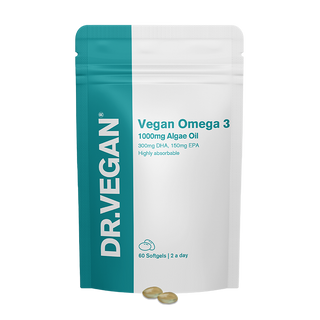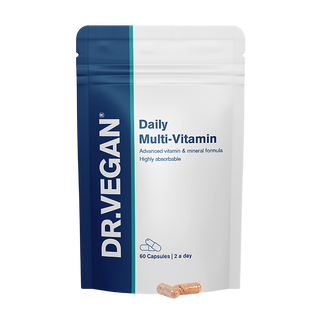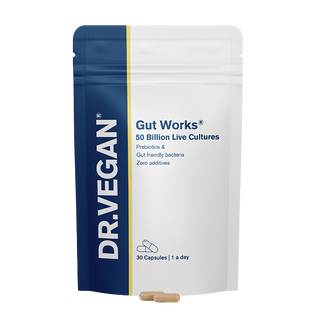8 things to keep calm, healthy and happy right now

Sustaining healthy rituals and daily routines can be difficult - it's easy for our eating habits and activity levels to change, our anxiety levels to fluctuate, and for our sleep patterns to be disrupted. These changes can happen at anytime, so our expert nutritionists share the best tips for maintaining emotional balance, focus, and happiness when we fall out of our routines. It's also important important to ensure our immune system is in peak condition and you may enjoy '8 immunity boosting foods'.
Tips for staying healthy and happy
Eight practical tips to keep healthy and happy at work and home.
1. Keep well hydrated
Studies show that by the time your thirst sensation kicks in, at around 2% dehydration, you are likely to experience impaired mood, memory and brain performance. Complex problem solving and tasks that require coordination and attention suffer the most. So, keeping well hydrated is vital to help you maintain focus in meetings, when studying, or even just driving a car.
Hydration is also important for essential functions in the body such as producing saliva to help us swallow, cushioning joints and helping the body naturally detoxify. Our brain needs water to make hormones and neurotransmitters, and dehydration can result in tiredness, poor concentration, headaches, dizziness or light headedness.
Water is a great option for keeping hydrated, but on cold winter’s day, a warm brew, a low-sugar fruit squash or a cup of soup may be more appealing. The caffeine in coffee can improve your alertness, but avoid drinking too much caffeine. Switch to decaf after lunchtime so that your sleep is not affected. Discover the best alternatives to caffeine.
Vegan Omega 3

2. Support your immune system
Your immune system is a complex system of cells, molecules and tissues and requires many different nutrients to function effectively. There is no single immune-boosting nutrient, we needs lots of different nutrients provided by different types and colours of food. As one example, red peppers have twice the level of Vitamin C than green peppers, which is vital for your immunity and healthy skin, and 11x more beta-carotene, which is converted into Vitamin A which is also important for your immunity. The immune system works better when it’s in balance, and the best way to support it is through a healthy and varied diet. Learn more in '8 immunity boosting foods'.
There is some evidence Vitamin C may reduce the duration and severity of the common cold. However, Vitamin C won’t prevent you catching a cold. Zinc has an important role in immunity, helping the immune cells fight infection and resist infection with viruses that cause the common cold. There is evidence that taking Zinc in a high quality daily multivitamin within days of catching a cold can reduce the duration of the cold by a day or two.
Daily Multi-Vitamin

Vitamin D is important for the function of the immune system and low levels of Vitamin D are linked with a reduced immune response. We get most of our Vitamin D from the sunlight in the summer months so, as we spend more time indoors, it’s particularly important to ensure you get enough Vitamin D in your diet as well as a daily supplement. Learn more in 'How do I know if I'm deficient in Vitamin D?'.
3. Be snack savvy
In the winter months or in times of stress you may find yourself craving more foods that are high in sugars and/or high in fat. This is known as 'comfort eating' and is your body’s way of trying to lift your mood, as these foods are linked with serotonin and dopamine production, the feel-good hormones.
While some foods are excellent for improving your mood, powder supplements are not one of them because they contain much lower levels of nutrients and fibre than food, they contain sweeteners, and they lead to long term health issues. Learn more in 'Exposed: Plant-sweeteners and type 2 diabetes'. If you get hungry between meals, have some pre-prepared healthy snacks such as chopped carrots, cucumber or celery to avoid reaching for unhealthy snacks. Pre-chopped veg with hummus, a pot of yoghurt with mixed frozen berries, or sliced apple with some nut butter are other good healthy snack options.

Discover new delicious healthy recipes.
4. Feed your gut fibre
One of the best ways to support your immune system is to keep your gut microbes happy. However, research shows that most adults eat an average of only 18g of fibre a day, and only 4% of women and 9% of men achieve the 30g of fibre daily target!
Around 70% of your immune system is found in your gut, so it’s vitally important to feed your gut microbes well. Your gut microbes love munching on fibre, and when they do, they produce short-chain fatty acids and by-products known as ‘post-biotics’ which are beneficial molecules for the immune system produced by probiotics. Including fruits, vegetables, wholegrains, nuts, seeds and legumes in your diet each day will help increase your fibre intake. You may also enjoy reading 'What are probiotics?".
5. Mood and the Mediterranean diet
With less daylight hours and more time indoors, along with the many challenges the pandemic brought, looking after your mental health is even more important this winter.
Evidence from two trials found that eating a Mediterranean diet had a positive impact on individuals with depression. The Mediterranean diet is generally high in fruits and vegetables, legumes, nuts, beans, cereals, grains, fish and unsaturated fats such as olive oil, and it usually includes a low intake of meat and dairy.
The positive impacts of the Mediterranean diet are likely to be due to its rich source of polyphenols (plant-based compounds) and its beneficial effect on the gut microbiome. In contrast, a Western-style diet, typically higher in processed, high-fat and high-sugar foods, has been associated with a higher risk of developing depression (Ljungberg et al. 2020). It's also to remember that it is the traditional Mediterranean diet, not a modern Mediterranean diet that is healthy - learn more in 'Is a mediterranean diet healthy?'.
Discover our delicious free recipes.
Our brains are made up of around 60% fat and so an adequate supply of healthy fats are also needed to maintain good brain function, particularly the omega-3 unsaturated fatty acids. Many foods in the Mediterranean diet provide omega-3s, such as oily fish, nuts and seeds. Include these in your diet and it is recommended for most people to take a high quality omega-3 supplement that provides the long-chain omega-3 fatty acids, because it is very common for intakes to be too low, especially if you don’t eat fish.
Other micronutrient deficiencies have also been associated with an increased risk of depression, including Folate, Vitamin B12, Vitamin D, Zinc, Magnesium and Selenium. Learn more in 'How your diet can improve your mental health'.
6. Manage your stress
A survey conducted at the start of the first lockdown during the pandemic (Ipsos MORI, 2020) found that half of people (49%) reported increased anxiety. Being kept indoors, darker months, and daily pressures at home and work can all raise our levels of anxiety.
When we’re feeling stressed or anxious, our body has an increased need for certain nutrients. However, hormones released when we are stressed can result in a loss of appetite, or cravings for foods high in fat and sugars. Our stress hormone, cortisol, can make us crave sugary, fatty foods which will result in a sugar rush and then a dip, which will worsen the symptoms of stress. The effects of stress can be severe, and if you're feeling the pressure, we recommend Stay Calm®, a unique plant-based supplement to help the body cope calmly with stress.
Eating wholegrain foods such as oats, brown rice or wholemeal bread and pasta will provide sustained energy which will help stabilise blood sugar levels. Including protein foods at each meal will help slow the release of sugars into the blood stream. Magnesium is a key nutrient for muscle and nerve function and ensuring you get enough of this mineral may help manage anxiety. Useful foods with Magnesium include nuts like almonds and cashew, spinach, soy, avocado, and brown rice.
While alcohol may help you feel more relaxed, regularly drinking too much can exacerbate stress levels. Men and women are advised not to drink more than 14 units a week - that's equivalent to 6 pints of average-strength beer or about 6 glasses of wine (NHS, 2018).
Remember, diet is only one factor to consider when managing stress. Physical activity, relaxation techniques, such as meditation, getting adequate sleep and social support can also help reduce stress and anxiety.
7. Get good quality sleep
Studies show that more than 1 in 3 people suffer from poor sleep. Regularly not sleeping well can increase risk of depression and anxiety, and disrupt your immune system. Your diet can impact your ability to sleep, and a poor night’s sleep can lead to an increased calorie intake the following day.
Reduced hours of daylight during the winter also impacts our sleep-wake cycle, making it harder to get up in the mornings. Longer dark evenings can increase snacking late at night, and too many sugary foods just before bed is likely to lead to poorer sleep. Having a hobby or planned evening activities to keep your mind occupied, or relaxing yoga or stretching may help prevent late-night snacking.
A low level of Vitamin D is associated with fatigue and a recent review has suggested that deficiency of Vitamin D is linked with a higher risk of sleep disorders. Also ensuring you get adequate Magnesium may help improve your sleep as it is important for the function of your nervous system and sleep cycle.
8. Don't forget your daily Vitamin D!
Studies show that more than 4 in 10 adults in the UK have insufficient levels of Vitamin D during the winter months. In the UK, the sun does not contain enough UVB radiation in winter months (October to March) for our skin to be able to make Vitamin D. Having a brisk lunchtime walk outside is great for your mood and mental health, but it won’t help your Vitamin D levels during the winter months.
While there are some good food sources of Vitamin D, such as foods fortified with Vitamin D, or oily fish and egg yolks, food sources alone are unlikely to keep your Vitamin D levels topped up, so a daily Vitamin D3 supplement is recommended. Vitamin D is fat-soluble so taking the supplement along with a meal can improve absorption.
Discover our range of award-winning vegan vitamins and supplements.
Want to hear more from our nutritionists? Sign up to our email newsletter for insights and exclusive offers:
References
Abbasi et al (2012) The effect of magnesium supplementation on primary insomnia in elderly: A double-blind placebo-controlled clinical trial. https://www.ncbi.nlm.nih.gov/pmc/articles/PMC3703169/
Al Khatib et al. (2016) The effects of partial sleep deprivation on energy balance: a systematic review and meta-analysis. https://www.nature.com/articles/ejcn2016201
Bates et al (2014) NDNS: results from years 1 to 4 combined. https://www.gov.uk/government/statistics/national-diet-and-nutrition-survey-results-from-years-1-to-4-combined-of-the-rolling-programme-for-2008-and-2009-to-2011-and-2012
Cuomo, et al. (2017) Depression and Vitamin D Deficiency: Causality, Assessment, and Clinical Practice Implications. Available at: http://www.jneuropsychiatry.org/peer-review/depression-and-vitamin-d-deficiency-causality-assessment-and-clinical-practice-implications-12051.html
Gao et al (2018) The association between Vitamin D deficiency and sleep disorders: a systematic review and meta-analysis. https://www.ncbi.nlm.nih.gov/pmc/articles/PMC6213953/pdf/nutrients-10-01395.pdf
Ipsos MORI (2020) Public opinion on the COVID-19 coronavirus pandemic. https://www.ipsos.com/ipsos-mori/en-uk/public-opinion-covid-19-coronavirus-pandemic
Jacka et al. (2017) A randomised controlled trial of dietary improvement for adults with major depression (the ‘SMILES’ trial). https://bmcmedicine.biomedcentral.com/articles/10.1186/s12916-017-0791-y
Khosravi, et al. (2020) The relationship between dietary patterns and depression mediated by serum levels of Folate and vitamin B12. Available at: https://bmcpsychiatry.biomedcentral.com/articles/10.1186/s12888-020-2455-2
Ljungberg, et al. (2020) Evidence of the Importance of Dietary Habits Regarding Depressive Symptoms and Depression. https://www.ncbi.nlm.nih.gov/pmc/articles/PMC7084175/pdf/ijerph-17-01616.pdf
Mulligan & Licata (2010) Taking vitamin D with the largest meal improves absorption and results in higher serum levels of 25-hydroxyvitamin D. https://asbmr.onlinelibrary.wiley.com/doi/full/10.1002/jbmr.67
NDNS (2018) National Diet and Nutrition Survey https://assets.publishing.service.gov.uk/government/uploads/system/uploads/attachment_data/file/699241/NDNS_results_years_7_and_8.pdf
NHS (2020) Vitamin D https://www.nhs.uk/conditions/vitamins-and-minerals/vitamin-d/
NHS (2019) The Eatwell Guide https://www.nhs.uk/live-well/eat-well/the-eatwell-guide/
NHS (2018) How to get vitamin D from sunlight. https://www.nhs.uk/live-well/healthy-body/how-to-get-vitamin-d-from-sunlight/
NHS (2018) Alcohol units https://www.nhs.uk/live-well/alcohol-support/calculating-alcohol-units/
NHS (2018) Why lack of sleep is bad for your health https://www.nhs.uk/live-well/sleep-and-tiredness/why-lack-of-sleep-is-bad-for-your-health/
NHS (2011) Supplements: Who needs them? https://www.nhs.uk/news/2011/05may/documents/bth_supplements.pdf
Parletta et al. (2017) A Mediterranean‐style dietary intervention supplemented with fish oil improves diet quality and mental health in people with depression: a randomized controlled trial (HELFIMED). https://www.tandfonline.com/doi/full/10.1080/1028415X.2017.1411320
Scheelbeek et al. (2020) Health impacts and environmental footprints of diets that meet the Eatwell Guide recommendations: analysis of multiple UK studies https://bmjopen.bmj.com/content/bmjopen/10/8/e037554.full.pdf
St-Onge et al (2016) Fibre and saturated fat are associated with sleep arousals and slow wave sleep. https://pubmed.ncbi.nlm.nih.gov/26156950/
Wang, et al. (2018) Zinc, Magnesium, Selenium and Depression: A Review of the Evidence, Potential Mechanisms and Implications. Available at: https://www.ncbi.nlm.nih.gov/pmc/articles/PMC5986464/
Wittbrodt & Millard-Stafford (2018) Dehydration impairs cognitive performance: A meta-analysis. https://journals.lww.com/acsm-msse/Fulltext/2018/11000/Dehydration_Impairs_Cognitive_Performance__A.21.aspx
Żόłkiewicz et al (2020) Postbiotics: a step beyond pre- and pro-biotics. https://www.ncbi.nlm.nih.gov/pmc/articles/PMC7468815/
Bates et al (2014) NDNS: results from years 1 to 4 combined. https://www.gov.uk/government/statistics/national-diet-and-nutrition-survey-results-from-years-1-to-4-combined-of-the-rolling-programme-for-2008-and-2009-to-2011-and-2012


















